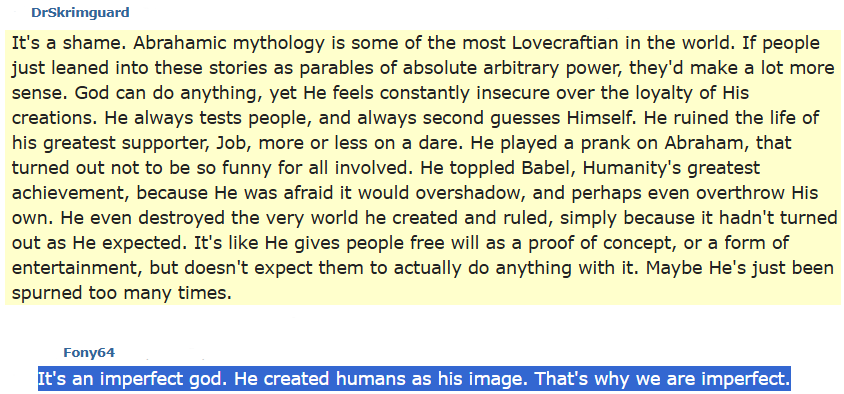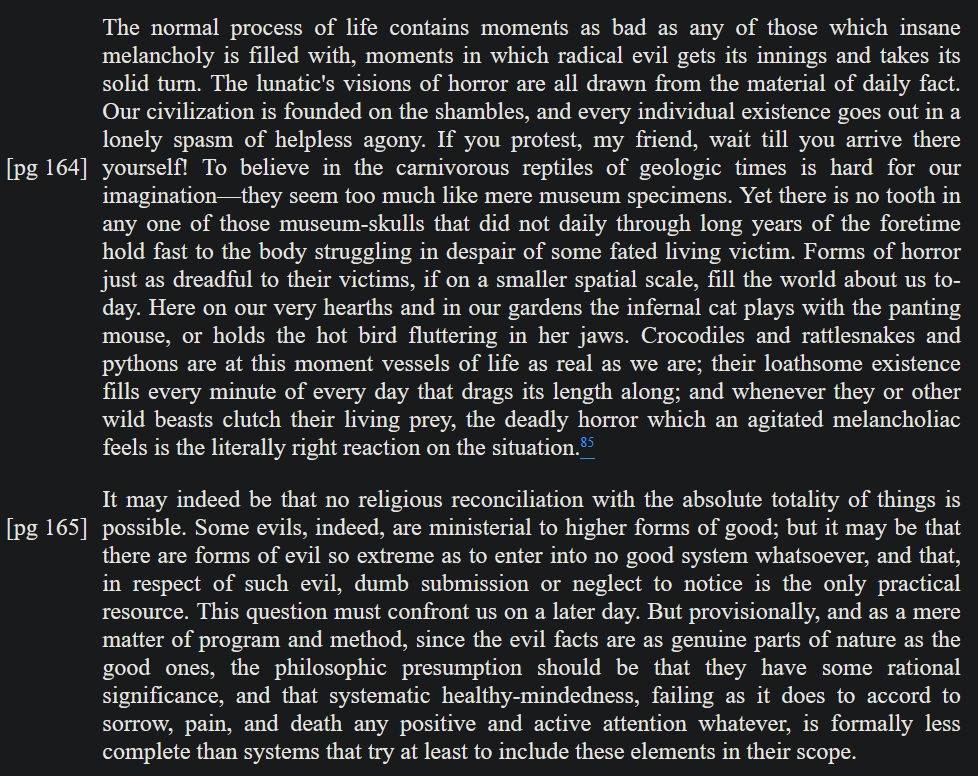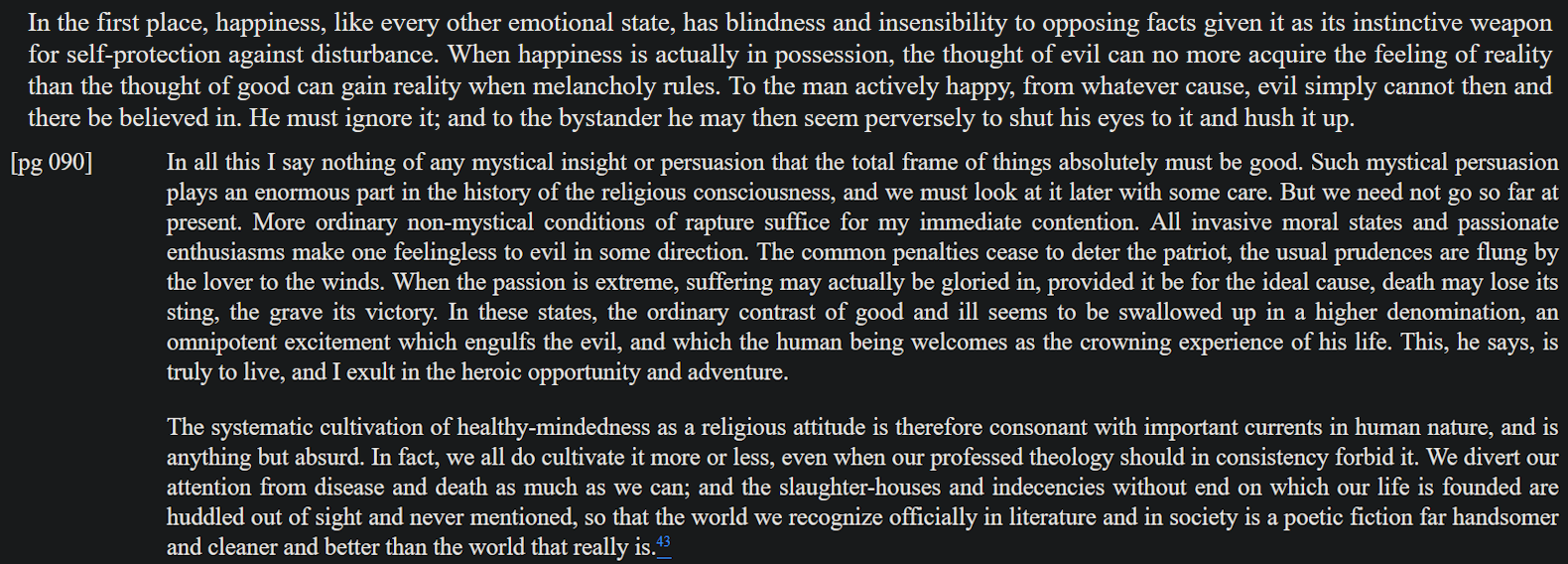φ Fear of God φ
(I genuinely apologize for the blasphemy)

I remembered the inital staging of the Book of Job: losing possessions, friends, & health yet still praising God, but I had forgotten how much of it is the argument between the three friends and one outsider: the clear struggle and wrestling with why God would forsake him after his initial acceptance. When the whirlwind comes it feels like a different speaker than the confident God who was challenged to test Job. The whirlwind speaks of Job's feeble weakness in comparison to itself and that its incomprehensibility means Job should accept his helpless ignorance. Even though the whirlwind says it is of such a magnitude, it nonetheless cares so much to lower itself to speak to Job and make sure he knows how great it is, rather than ignore Job and let him sink into Sheol.
The first two minutes of this clip are widely circulated, but the conclusion, the transformative conclusion, is often not included. Though Herzog acknowledges the unnecessary terror of the sea of screams, he nonetheless does not hate it, but loves it, despite his better judgment. I feel all this both to nature and to god but I cannot bring myself to love. I am still an obstinate child of whom the awe does not reach, just the feeling of helpless weakness, and so the fear of god is merely fear. How can you forgive that?
This sense of a higher power, the fascination and awe. I get a little bit of it but it usually inspires an extreme unease for me rather than the love others feel for, mountains, giant ships, skyscrapers, and so on.
(Sidenote: religious, grand buildings that people used to make pilgramages to. The average shopping mall has the same enormous proportions if not bigger but is so banal or despised despite its size)

φ Divine Purity φ
To go over stereotypes and cultural norms of the past (that continue). The earth and dirt of the Masculine: hairy, smelly, and forceful. The divine and angelic of the Feminine: wisdom, beauty, creativity. Even though they are both of the Earth, many cultures try to force aspects of femininity into being otherworldly. Goethe's eternal feminine, the holy mother of Shri Ramakrishna and Jesus of Nazareth. The attempt at purity from various cultures that become terrifying when taken to extremes like victorian expectations for women, Marianismo, purity balls, male gazey transience - young and beautiful until thrown away and forgotten (and so with the many concepts of impermanence around the world). Many of these conceptions of women as divine are from male perspectives (conceptualzing divine, creative inspiration as elusive muses and so on). -- (sidenote, the old practice of calling any sentient thing he by default and using she for any object or concept (boats and nations)). Even if it is in the opposite direction of degradation, trying to make women pure and angelic in culture is still dehumanization. A history of keeping periods, pregnancy, birth, and menopause hidden and taboo when they are so very earthly. A non-pure woman is apparently not of the earth, but hellish. (But these are not set. Desire for men who have aspects of the divinely feminine embodied, and desire for women who have aspects of earthly masculinity embodied). There are Yang beauties, like stones and gems which are immortal in our lifetimes (even though the Yin can slowly, gently erode them)
~ Transient and fragile
~ Immortal and strong
~ The Yin beauties like flowers and sounds
~ The Yang beauties like stones and gems
~ Because of our consciousness and memory, we embody aspects of both but are neither fully divine nor fully earthly.
~ Neither immortal nor transient
~ We are the creature between sea and sky
Veiled in taboo, the organs of us that perform the sacred acts of love and are professed as alluring, are also the areas where the most unclean and disgusting processes take place.
That indeed we all are both, at the same time, divine, beautiful, repugnant, and filled with excrement...
Can this be embraced?
(to strive to at least accept it, you must face our middle place... it is so difficult, is it even possible after having drunk so deep?)
φ Divine Submission Interlude φ
The Tao submissiveness, letting go and submitting to the divine order conceived as a feminine trait. Divinity flowing through you is often the highest goal or joy (for mystic examples see The Varieties of Religious Experience), but the contradiction that being forced to do something you don't want to do is one of worst things that you can experience. So many conceptions as submitting to the higher will of something greater than you. In the moments of great stress and turmoil that lead to great changes like conversion or becoming apostate, you have to break yourself down to nothing and allow the oceanic feeling of god to take you in self-surrender to receive insight. For non-mystics, there is the desire to find and follow "god's plan" for your life and your environment.
Finding balance between not wanting decision paralysis vs not wanting things forced on you. As well as, not wanting to have to make decisions vs not wanting decisions made for you. In practical experience things like playing an instrument, writing, athletics, various skills... to do it really well you have to do it enough to where you can 'let your body take over for you.' When you do these things and something beautiful comes out of it, it feels as though you are a conduit, a medium, for divinity flowing through you from the realm unseen. 'It must have been the divine moving my hands! I felt I had no part in it other than allowing myself to be moved by it! I could not have done it myself!' Even just for entertainment/escapism, what people are often trying to do is lose themselves: video games, TV, reading, drugs, listening to music (perhaps the highest/basest form, the trance of dance) - the goal is to give yourself over to it and let it sweep you away.
φ Divine Purity Continued φ
Finding it hard to shake the worldview that the world is not good, (conceived as a dark place with points of light, or an overwhelming world of buzzing light with a few spots of cool shade). Anything good happening is like a divine blessing of outrageous luck. The neutral world of inorganic matter is neutral, but the arising of biology leads to the possibility of the screaming of nature for those that develop pain and fear. We only get glimpses of fragile and transient divinity in our world but we desire so, so much for that impossible perfection. I know in part of my mind that perfection is impossible and should not be strived for, but I've glimpsed it and deep down I want it so badly. But is it an illusion?
Is self hatred derived from getting a glimpse at divinity and realizing that we are groveling in the dirt? Would there be self hatred if we never saw? Many humans have glimpsed, or lived through, hell on earth, and some have been able to carry on. But to have glimpsed elusive heaven, can you go on living in the mud? (In my personal experience, it feels worse to be awoken to horrors in a lake once thought pure).


The obsessive compusions of a religion like Shinto, which aches for purity. To wash and be clean, and to wash again. 'More water! More water! Carry away all my impurities. Let them fall and rest somewhere far away, let all that falls off of me sink to the deepest caves, never to come near me again. Let what is left of me be so light as to float to the heavens.' ...But it is never enough. the more we clean, the more impurities we find...
'It is true and apparent water is delivered upon us from the heavens. It pools upon the world in sacred places and it runs its streams upon the spiritual currents of the land. Of the elements four, it is discerned by scholars of all lands and ages that water is of the utmost purity, and thus the easiest to be ravaged, and tainted afoul. At the bottom of the deepest of oceans there lies, upon reflection, a vast sea beyond.
For it is water thus which is the wellspring of all life. From its depths have we risen, from its grace we live, and to its depths shall we return. We are but empty vessels partaking in holy communion. Do we not thirst night and day?'
And again, as we continue to live with the ambiguity, the ever pervasive Maybe. Living without certainty we wave between hope and despair.
That indeed we all are both, at the same time, divine, beautiful, repugnant, and filled with excrement...
Can this be embraced?
(to strive to at least accept it, you must face our middle place... it is so difficult, is it even possible after having drunk so deep?)